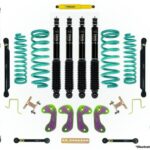The automotive world is constantly chasing the perfect balance of power, handling, and, crucially, weight. A recent discussion in car enthusiast circles, sparked by observations about increasing vehicle weights, brings up a critical point: how much does weight really matter, and are manufacturers prioritizing it effectively, especially when considering models like the BMW G80 M3 Competition?
The original poster, John.K, highlighted a scenario where, faced with rising car weights, an automotive chief engineer might be tempted to dedicate resources to weight reduction to gain a competitive edge. This is an appealing idea for enthusiasts who understand the direct correlation between less weight and improved agility, acceleration, and braking. However, the reality is often more complex.
As the responding post points out, making a business case for significant weight reduction is challenging. While on paper, a lighter car, say an Audi RS5 shedding 100 lbs, seems inherently better, the market demand might not reflect this. Does a slightly lighter RS5 demonstrably outsell a slightly heavier one? The investment in extensive weight reduction programs, involving research, development, and potentially more expensive materials like carbon fiber or aluminum, needs to show a return. If buyers are not demonstrably choosing cars based solely on marginal weight differences, manufacturers must consider where to allocate their R&D budgets for the greatest impact on sales and profitability. Focusing solely on weight might divert resources from other areas that consumers prioritize more, such as advanced technology, luxurious interiors, or even just more aggressive styling. If a competitor invests in these areas and gains market share while your weight-reduced model doesn’t see a corresponding sales boost, you’ve potentially put yourself at a disadvantage.
This isn’t to say weight reduction is irrelevant. For true sports cars and performance-focused models like the G80 M3 Competition, weight remains a crucial factor. Enthusiasts shopping in this segment are often more discerning and appreciate the nuances of lightweight engineering. BMW, with its M division, understands this market segment intimately. The G80 M3 Competition, while not the lightest car in its class, incorporates intelligent material choices and engineering to optimize weight distribution and minimize unnecessary mass. It’s a balancing act: delivering the performance and driving dynamics expected of an M3 while also meeting modern demands for safety, technology, and some degree of comfort.
Ultimately, while the dream of featherweight performance cars persists, the automotive industry operates within the constraints of market demands and business realities. For models like the G80 M3 Competition, manufacturers strive for an optimal balance, recognizing that while weight is a critical performance metric, it’s just one piece of a much larger and more complex puzzle. The G80 M3 Competition aims to deliver a thrilling driving experience, and its weight is carefully managed within that broader performance equation.
